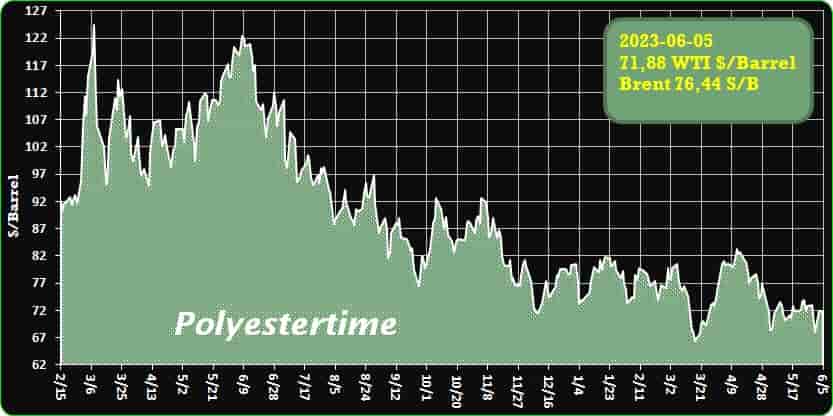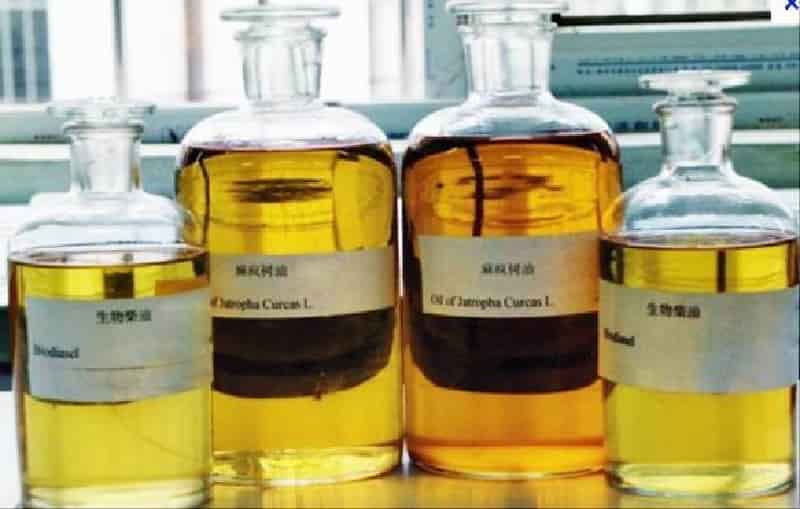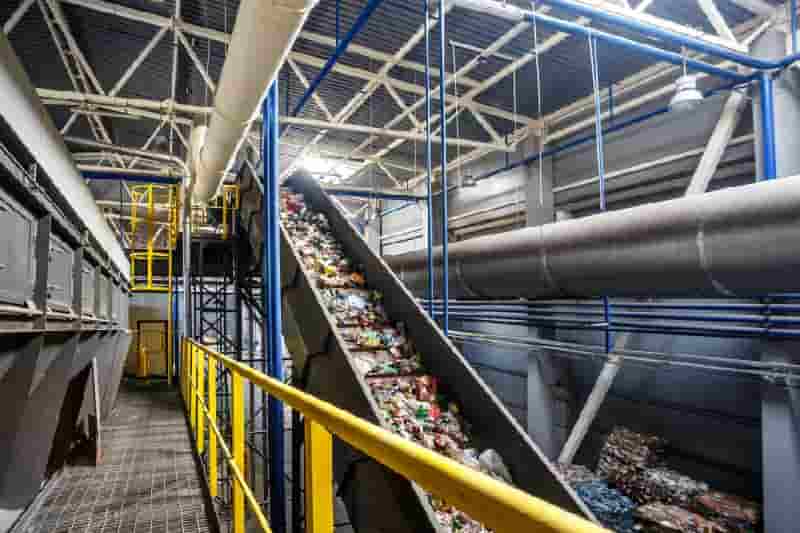Flexible film recycling – Adipic-Acid 05-06-2023 - Arhive
Flexible film recycling – Adipic-Acid
-Petrochemicals – BGPET – Adipic Acid

Crude Oil Prices Trend

Crude Oil Prices Trend by Polyestertime
-Alpla acquires iTEC Packaging’s Mansfield plant
Packaging specialist Alpla Group has announced the acquisition of Mansfield, UK-based packaging design and manufacturing firm iTec Packaging. Terms and conditions of the deal were not disclosed. iTec, which specialises in the production of closures mainly for dairy, but also food and beverage sectors, and its sister site iTEC Packaging (Chester-Le-Street) Limited, had been placed into administration in April 2023 following financial pressures caused by difficult trading conditions. Last month, the Chester-Le-Street business was sold to Shalam Packaging Group. Now that a buyer has been found for the Mansfield business, nearly 200 jobs have been saved across both sites. All employees at the Mansfield plant will be retained.
For Alpla, the takeover will enable it to expand its expertise as a packaging system provider on the UK market. The company will further promote the use of post-consumer recycled material in the closure sector and strive to offer complete solutions with a high recycled content – one example of which is its Eco-Bottle, currently made from up to 40% food-grade rHDPE. Flexible film recycling – Adipic-Acid
“With our global know-how, with this acquisition we can increasingly offer the UK dairy industry sustainable, efficient and innovative packaging solutions,” said UK managing director Jens Seifried.
The takeover was contractually agreed on 26 May 2023.

-Eni bets on agri-business in Africa to expand biofuel production
Italy’s Eni is investing in farming in several African and Asian countries as it aims to produce by itself around one fifth of the agricultural feedstock it will need for its biofuel business by 2025, two top executives at the energy group said, said Reuters.
Energy companies are betting on increasing demand for fuels made from vegetable oil, waste cooking oil and grease, which they say will play a key role in decarbonizing the truck, aviation and shipping sectors in coming years. To satisfy this expected demand, Eni is ramping up its bio-refining capacity and, at the same time, is expanding farming ventures to secure supplies and reduce the risk of excessive volatility in the commodity market.
“Our goal is to cover 20% of (our) biofuel production with feedstock coming from our agri-business by 2025, which is a relevant threshold since we have increased our output targets,” Eni Energy Evolution Chief Operating Officer Giuseppe Ricci told Reuters in an interview. Flexible film recycling – Adipic-Acid
In February Eni said it targeted bio-refining capacity of more than 3 million tons per annum by 2025 and over 5 million tons by 2030, from the current 1.1 million.
This compares with forecasts by analysts at Barclays of global biofuel demand tripling to 30 million tons by the end of the decade. Eni has signed deals with several countries to identify degraded land where farmers cultivate crops that do not compete with the food supply chain.
“We have pools of local farmers who cultivate for us … we get seeds, squeeze them and take the oil to our bio-refineries,” said Guido Brusco, Eni Natural Resources chief operating officer. The oil also derives from agro-industrial waste and residues.
Around 700,000 farmers are expected to be involved in Eni’s farming activities by 2026, under deals signed with Angola, Benin, Republic of Congo, Guinea Bissau, Kenya, Ivory Coast, Mozambique, Rwanda and Vietnam. Feasibility studies are under way in Italy and Kazakhstan. The business model is similar to the one Eni applies in its hydrocarbon business. Flexible film recycling – Adipic-Acid
“We are replicating the vertical integration we have in other commodities and the logic is to reduce volatility, secure the raw material, and have more control over costs,” Brusco said. Also following the vertical integration model, BP is considering buying stakes in biofuel feedstock producers and investing directly in farming ventures, BP head of biofuels Nigel Dunn told Reuters.
Eni says biofuels can cut net greenhouse gas emissions by between 65% to 90% compared with fossil fuels, depending on the type of raw material and the production process. “By the end of this year we will take the final investment decision over a new bio-refinery in Livorno (Italy),” Ricci said. This will add to two existing Italian bio-refineries and two potential new plants in the United States and in Malaysia.
Even if biofuels have higher costs, the fact that they can be produced with existing infrastructure make them a competitive solution to decarbonize transport, Ricci said.
We remind, Eni has launched an initiative to encourage the use of HVOlution, Eni Sustainable Mobility’s first diesel produced from 100% renewable raw materials (according to EU Directive 2018/2001 ‘REDII’), by its suppliers’ vehicles transporting fuels to Eni Live Stations. It aims to contribute to the decarbonisation of the heavy transport sector, which involves approximately 300 vehicles in Italy’s distribution service. To date, more than 200,000 km have been covered using pure HVO, making it a major contributor to CO2 emission reduction. Flexible film recycling – Adipic-Acid

-European Market at Risk of Drowning as Biodiesel Imports Surge
The European Waste-based Advanced Biofuels Association (EWABA) has expressed concerns that an influx of potentially questionable biodiesel imports from China could have dire consequences for the European Union’s biofuels sector. EWABA urged the EU to intensify its scrutiny of these imports, warning that failure to do so may lead to the collapse of the industry, according to Reuters.
With the aim of boosting renewable energy usage, the EU has provided incentives for the production of biodiesel derived from waste oils and fat. However, EWABA revealed that 11 European biodiesel plants have already ceased operations, while an additional 10 have scaled back their production capacities. This downturn has been linked to the rising tide of biodiesel imports from Chinese producers, as evident in both EU and Chinese customs data. The surge in imports, particularly waste-based biodiesel, has adversely affected rapeseed prices, as highlighted by the European vegetable oil industry group FEDIOL.
Traders have reported a significant decline in offer prices for advanced biodiesel in Europe, nearly halving since August. Flexible film recycling – Adipic-Acid
This reduction has impacted the earnings of producers. EWABA argued that the current EU-backed inspection mechanism has been inadequate in scrutinizing imports, while spot audits conducted in China fail to ensure the use of sustainable materials, notably palm oil, in the production of biofuel.
To avert the risks posed by these developments, EWABA stressed the necessity of robust international auditing and verification practices, in addition to effective oversight and regulation. The association emphasized the need for vigilant policing and the prevention of dubious or fraudulent activities in the waste-based and advanced biodiesel sectors. Although specific Chinese companies were not mentioned, EWABA called upon the European Commission, the German Federal Ministry for the Environment, and the Dutch Emissions Authority to address these concerns urgently.
In their open letter, EWABA cautioned that without decisive action from authorities, the European biofuels industry could face an irreparable collapse.
This scenario would result in de-industrialization and significant job losses, posing a grave threat to the economy. Flexible film recycling – Adipic-Acid

-European Market at Risk of Drowning as Biodiesel Imports Surge
Cassuti was appointed by the Consortium’s Board of Directors, succeeding Giorgio Quagliuolo, who has completed his three-year term.
In his statement, the new President acknowledges Corepla’s significance as a model in the packaging recycling system, emphasizing its forward-looking approach that extends beyond separate waste collection. He recognizes the Consortium’s 25-year legacy marked by a commitment to raising public awareness, research, innovation, and aims to contribute his experience and expertise to promote best practices and uphold the exceptional achievements to date.
Quagliuolo, the outgoing President, lauds Corepla’s dynamic structure, which has successfully adapted to the changing times by fostering collaboration between citizens, institutions, and businesses in the context of a circular economy.
He views the present as a time of innovation, the exploration of alternative avenues, and the pursuit of new investments to guide the supply chain towards remarkable outcomes.
Quagliuolo expresses confidence in Cassuti’s ability to address these significant challenges and maintain Corepla’s role as a catalyst for transformative change.
A brief biography of Giovanni Cassuti reveals his origins in Vicenza in 1965. As the head of Versalis’ Elastomers Business Unit, a chemical company within the ENI group, he oversees an international sales network, the operations of four European plants, and the development of a joint venture with Lotte Versalis focused on Elastomers in South Korea. Cassuti’s career includes a stint in university research before assuming the position of CEO at Dunastyr, a Hungarian company under the control of Polimeri Europa (now Versalis). Upon returning to the company, he first led the Polyethylene division and later assumed leadership of the Elastomers division. Flexible film recycling – Adipic-Acid
Cassuti is also a Board Member of the International Institute of Synthetic Rubber Producers (IISRP) and serves on the Advisory Board of the Alliance to End Plastic Waste (AEPW).

-LyondellBasell puts exit from refining operations temporarily on hold
Plans to cease operation in the first quarter of 2025
LyondellBasell has postponed its exit from its refining business from the end of 2023 to the first quarter of 2025, at the latest, the company has announced.
Moderate maintenance is expected to support the delay of the shutdown but the company emphasised that it remained committed to ceasing operation of its oil refining business.
The delay will allow more time to minimise workforce impact, said Lyondell Basell. As well, it will
smooth the transition between the shutdown and the implementation of the retrofitting and circular projects.
The company plans to transform the refining site and to ready this for growth that in the future will be based on the development of sustainable solutions. Plans are in place to for the 700-acre site to be integrated into a Houston regional hub for the company’s growing Circular and Low Carbon Solutions business and to support the growth of the LyondellBasell Circulen product portfolio. Already, the company has a suite of future projects in the early stages of development, noted Peter Vanacker, CEO of LyondellBasell.
Multiple options are being evaluated including recycled and renewably-based feedstocks and green and blue hydrogen. Flexible film recycling – Adipic-Acid
The growth projects under development would connect to existing assets in the Houston area and use existing infrastructure on the refining site including hydrotreaters, pipelines, tanks, utilities, buildings, and laboratories.

Credit : LyondellBasell
-Flexible film recycling pilot launches in Canada
A number of circularity organizations have collaborated to launch PRFLEX, an effort to improve flexible plastic recycling in Canada.
A press release noted that the organizations behind PRFLEX share a common goal of increasing the use of recycled content in plastic packaging, and “for that to happen, we need improved sortation and recycling capacities in Canada.”
Those organizations are The Canada Plastics Pact, the Chemistry Industry Association of Canada, Circular Materials, the Circular Plastics Taskforce, Éco Entreprises Québec and The Film and Flexibles Recycling Coalition of the The Recycling Partnership, all of which are looking to collect baseline data on film recycling and improve collection rates.
“This first-of-its-kind initiative represents a stepping stone towards that objective by way of assessing the current situation and designing high performing systems for films and flexibles across the country,” the PRFLEX leadership team said in the press release. “We look forward to working together to increase recycling rates and advance a circular economy in Canada.” Flexible film recycling – Adipic-Acid
Consulting firms NovAxia and Lichens Recyclability will help PRFLEX gather baseline data on what percentage of flexible plastic packaging is currently being collected and recycled in each province, broken down by format and type, then identify infrastructure gaps at materials recovery facilities. The project will propose new technologies and processes to increase capture rates and improve sorting, then test those ideas in partner facilities.

